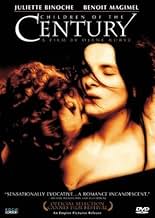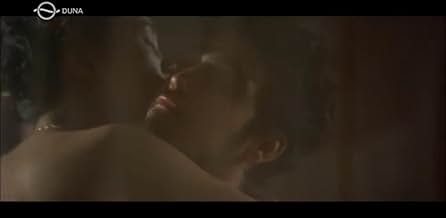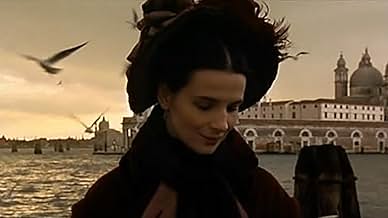PUNTUACIÓN EN IMDb
6,5/10
2,1 mil
TU PUNTUACIÓN
Añade un argumento en tu idiomaA story of doomed passion between two genius writers of the 19th century - novelist George Sand and poet Alfred de Musset.A story of doomed passion between two genius writers of the 19th century - novelist George Sand and poet Alfred de Musset.A story of doomed passion between two genius writers of the 19th century - novelist George Sand and poet Alfred de Musset.
- Dirección
- Guión
- Reparto principal
Victoire Thivisol
- Solange
- (as Victoire)
Reseñas destacadas
Wonderful mise-en-scene of a true passion that turned out to a, damaging love to hate you syndrome especially for Musset. Georges and Musset, they can't do with nor without each other. Their love was the spring of their inspiration that triggered their talent but the problem was that this love could feed only one's inspiration at a time.
Wonderful pictures, acting and especially costume design capture us in the late 1880's France which was a very nice experience.
Wonderful pictures, acting and especially costume design capture us in the late 1880's France which was a very nice experience.
I saw this film in French with Spanish subtitles so I had to read very fast! The photography is beautiful. I had not seen either of the principal actors before but I will look for them again. Miss Binoche made George Sand a real person not just an odd woman! The actor who played Alfred de Musset, showed him as charming but weak, very well done.
If you have any interest in French Romanticism, or romanticism in general, see this film. The story is taken from both Musset's & Sand's accounts of the affair that took place. If a film is to be made about a poet, use the poets feelings and even words at the most opportune times, this film does that, and then some. This film is well crafted, from every aspect of its making. The performances by Binoche & Magimel are both riveting and heart wrenching.
If this love were a battle, the filmmaker would most definitely taken the side of Sand. As the truth of this affair left Musset's heart dispirited until his death. Even his friends, like Eugene Delacroix, have said that his pen was a poison that infected his reader like a virus. But all histoire aside, as a film, this is an exquisite piece of work, that is both heart-breaking and entertaining. In the words of the central characters, "Shame on you, who are the first to show me treason. The horror and anger, which made me lose my reason."-Alfred de Musset "The angels are no more pure than the heart of a young man who loves truthfully."-George Sand
Above all watch this film and judge for yourself.
If this love were a battle, the filmmaker would most definitely taken the side of Sand. As the truth of this affair left Musset's heart dispirited until his death. Even his friends, like Eugene Delacroix, have said that his pen was a poison that infected his reader like a virus. But all histoire aside, as a film, this is an exquisite piece of work, that is both heart-breaking and entertaining. In the words of the central characters, "Shame on you, who are the first to show me treason. The horror and anger, which made me lose my reason."-Alfred de Musset "The angels are no more pure than the heart of a young man who loves truthfully."-George Sand
Above all watch this film and judge for yourself.
If Romanticism, as a movement, can be defined as an "infinite longing" which combines passion and erotic tension with death, despair, and the cycles of nature, then Kurys film portrayal is aptly named and her protagonists--Alfred de Musset and Georges Sand--are indeed children of their century.
The key to understanding the point of this film is to think of it as a painting. It does not give you an insider's view of the relationship between these two literary giants; it does not break down their psychology; and you do not even understand why you, as an audience member, should like either of them. Yet their obsessive love was a monument for the first major artistic movement of the 19th century. Kurys paints them as Delacroix would--in all their lurid color, capturing the details of high emotion without explaining a thing. As painting on film, Les Enfants succeeds as wildly as any Romantic dreamscape and, thus, captures the mood of that era and the sentiment which spawned it more perfectly than 1,000 words on the subject.
The key to understanding the point of this film is to think of it as a painting. It does not give you an insider's view of the relationship between these two literary giants; it does not break down their psychology; and you do not even understand why you, as an audience member, should like either of them. Yet their obsessive love was a monument for the first major artistic movement of the 19th century. Kurys paints them as Delacroix would--in all their lurid color, capturing the details of high emotion without explaining a thing. As painting on film, Les Enfants succeeds as wildly as any Romantic dreamscape and, thus, captures the mood of that era and the sentiment which spawned it more perfectly than 1,000 words on the subject.
I was really hoping to find some special quality in the two main characters that I could like. However, self absorbed people are usually too melodramatic about every single aspect of their lives and so I had no sympathy for their predicament at all. So, I settled back and enjoyed Julliet Binochet at work. The film was meticulously crafted and the settings and costumes were wonderful, so I got the time machine effect, too. If you like historical melodrama, you might enjoy this.
¿Sabías que...?
- CuriosidadesGeorge Sand's estate loaned the production some of Sand's jewelry, including a sapphire ring, which Juliette Binoche wears throughout the film.
- Citas
George Sand: Love does exist, it's not an illusion. One merely has to recognise it, and be humble before it.
- Versiones alternativasThe original French theatrical version, which runs at 135 mins begins as Sand plans to leave her husband and Musset's father dies. This version continues after their final meeting as Sand begins to write her story and attempts in vain to see Musset one last time. This version ends with a direct to camera address by Sand at Musset's tomb. A shorter theatrical version was released in Germany, Spain, UK and US which begins with Sand reading from "Lélia" and ends with Sand and Musset's final meeting. It runs at 105 mins. This version contains two new scenes: Sand and Musset being introduced to each other and a dance sequence. However the opening sequences featuring Sands arrival in Paris during an uprising and her relationship with Marie Dorval are lost, as are the closing scenes as she attempts to see Musset a final time. Most DVD releases have favored the Original 135 min version which was more critically popular.
- ConexionesVersion of Canción inolvidable (1945)
Selecciones populares
Inicia sesión para calificar y añadir a tu lista para recibir recomendaciones personalizadas
- How long is Children of the Century?Con tecnología de Alexa
Detalles
- Fecha de lanzamiento
- País de origen
- Sitio oficial
- Idioma
- Títulos en diferentes países
- Children of the Century
- Localizaciones del rodaje
- Empresas productoras
- Ver más compañías en los créditos en IMDbPro
Taquilla
- Recaudación en Estados Unidos y Canadá
- 56.611 US$
- Fin de semana de estreno en EE. UU. y Canadá
- 8044 US$
- 15 sept 2002
- Recaudación en todo el mundo
- 381.624 US$
- Duración2 horas 15 minutos
- Color
- Mezcla de sonido
- Relación de aspecto
- 2.35 : 1
Contribuir a esta página
Sugerir un cambio o añadir el contenido que falta

Principal laguna de datos
By what name was Confesiones íntimas de una mujer (1999) officially released in India in English?
Responde































